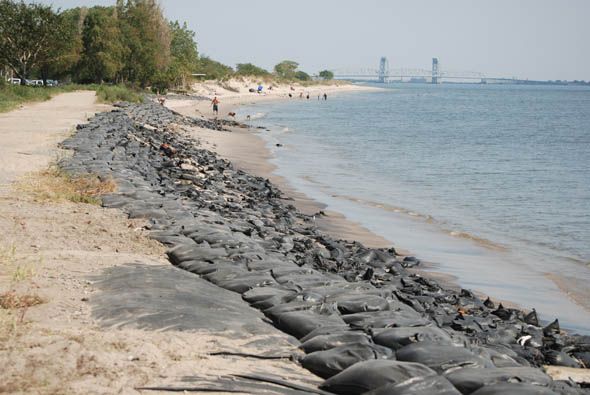Plumb Beach Fix Not Likely Until 2012, Says Corps

By Benjamin Preston
Residents may face at least two more storm seasons before the Belt Parkway and Plumb Beach are effectively protected from the ocean’s destructive tides.
The Army Corps of Engineers has been commissioned by a conglomeration of federal, state and city agencies to complete a $100,000 feasibility study examining long-term solutions for sand erosion at Plumb Beach. But Dan Falt, the Corps’ project manager, said that construction is not likely to begin before January 2012. He said the stacks of sandbags are designed to last anywhere from three to five years.
“The temporary sandbag fix will be in place until we can have a more permanent fix,” said Falt, adding that his team aims to have a draft version of the study available in January or February of 2011. “The Corps of Engineers feasibility study will provide four or five options with the goal of giving the best protection for the least cost.”
With several tiers of sandbags between the water and the freeway, high tide still comes within 10 feet of the Belt Parkway’s guard rail in the area where last year’s storm damage was most severe.
The Corps hasn’t replenished Plumb Beach since 1992, but Falt said they plan to use 80,000 to 100,000 cubic yards of sand from the agency’s biennial dredging of Rockaway Inlet to bolster the waning coastline’s supply of sand. He pointed out that sand replenishment is also a temporary fix, designed to last about five years. Some of the possible, and more permanent, solutions to Plumb Beach’s erosion problem Falt listed include a small breakwater, jetty or other engineered solution.
Construction of a seawall along the bike path or highway is not being considered, he said, because such a device would protect transportation routes, but would also be likely to accelerate erosion of the beach. Plumb Beach is known as a mating spot for scores of horseshoe crabs every spring, an occurrence accompanied by a large number of migratory waterfowl who come to feed on eggs left in the sand by the crabs.
Once the Corps’ draft report is published, the public will be afforded an opportunity to weigh in on project options.
But the time-frame does little to accommodate local cyclists and beach-goers. The city Parks Department was scheduled last spring to fix a 100-yard section of the bike path wiped out by a storm in November of last year. Full repairs were never made, though, leaving cyclists with an abrupt end to the pavement. Some riders are taking a dangerous detour on the Belt Parkway to get around the sand trap.
Ben Preston is a student at the Columbia University Graduate School of Journalism. He was previously a staff reporter at the Santa Barbara Independent and Noozhawk.com – Santa Barbara, California-based local news publications – covering county government, land use, and environmental issues.




